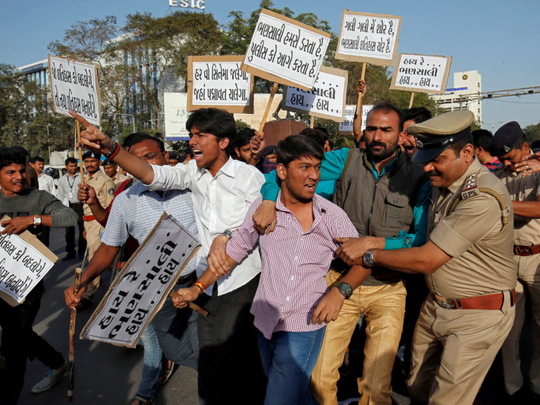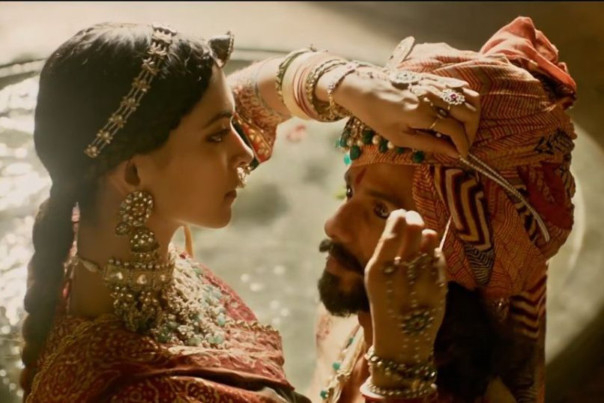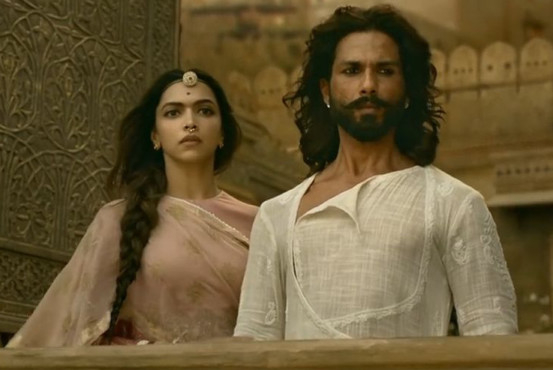
It’s deemed career suicide for Bollywood superstars to keep a low-profile before their film is perched for global release.
But if it’s a controversy-addled period epic like director Sanjay Leela Bhansali’s Padmaavat — starring Deepika Padukone, Ranveer Singh and Shahid Kapoor — then less said the better.
Anything they say can be misconstrued.
This visually spectacular tale of a 14th century Hindu queen belonging to Rajput community and the Muslim invader Alauddin Khilji has attracted widespread backlash. Bhansali’s labour of love, made at a massive Rs1.9 billion (Dh6.97 billion) budget, has snowballed into a politically-charged juggernaut with Hindu right-wing groups and Rajput organisations resorting to violence and death threats. Their list of charges vary — allegations that Bhansali distorted historical facts, a perceived intimate scene between Khilji and their revered Rani Padmavati (an accusation that Bhansali has categorically denied), and fear that Padmaavat will disrespect Rajput community’s pride and valour.
The off-screen drama that played out in the last few months would rival any Bollywood potboiler. Angry mobs, violent protests, threats declared against Padukone and Bhansali are some of the eventful episodes that marred Padmaavat. It isn’t easy to keep up, but Gulf News tabloid! has tried to put together a timeline of all the drama that surrounded Padmaavat...
January 2017: Karni Sena, a caste-based political outfit, vandalised the sets erected at Jaigarh Fort in Jaipur. Videos surfaced of the fringe mob assaulting director Bhansali along with shouting anti-Padmaavat slogans. The damage included destroying expensive film equipments.
March 2017: This attack was more severe and structured than their vandalism in January. Around 30 unidentified people, armed with petrol bombs and sticks attacked the sets of the movie in Kolhapur. They torched the movie sets, burnt costumes that were stacked inside in trunks and hurt the animals that were used for filming. This violent episode prompted Bhansali to put out a statement that he’s making a film that every Indian will be proud of and that such protests were unjustified.
“There are too many misconceptions and misunderstandings surrounding my film, Padmavati. I feel the need to clear the air once and for all. Padmavati is a film about a revered Rajput Queen and her valiant fight for honour and dignity … My team and I have carefully researched every aspect of information available on Rani Padmavati for making the film. There was never any alleged romantic scene, dream sequence or imaginary song between Rani Padmavati and Alauddin Khilji in the script. I repeat, there NEVER was and NOR is there any such scene between Rani Padmavati and Alauddin Khilji,” said Bhansali in his statement. He also sent out a another official letter to all the social organisations headquartered at Shree Rajput Sabha requesting, the bouquet of Rajput welfare groups, to refrain from violence and to support his crew in their endeavour to make their film.
October 2017: A group of 100 people destroyed artist Karan K’s rangoli [artwork by coloured powder] in Surat promoting the film. Soon after the violent incident, the artist tweeted that a crowd of about 100 people had destroyed his artwork, which took more than 48 hours to create, and sparked fierce debate online.
November 2017: The protests against Padmaavat gathered momentum and escalated to widespread calls for its India-wide release ban.
As elections in Gujarat drew closer, the state joined Madhya Pradesh in its demand to withhold the release of this film. The Karni Sena demanded that the movie be screened to them before the release and the ruling Bharatiya Janata Party members wrote the Election Commission, Central Board Of Film Certification and the Modi government, to help in their cause to ban the film. Haryana BJP leader Suraj Pal Amu even declared a Rs100 million bounty on Padukone and Bhansali’s lives. Karni Sene member also threatened to chop off Padukone’s nose.
Protests were staged in Chittorgarh in Rajasthan and a day-long strike was observed. Schools and markets were shut on that day. But in Kota in Rajasthan, the protests turned violent. A man was also found hanging at Jaipur’s Nahargarh fort and on the stone wall it was scribbled: “Padmavati ka virodh (in opposition to Padmavati)”. It wasn’t clear if it was murder or suicide.
On November 28, the Supreme court dismissed the petition filed against the release/ban of Padmavat. It stated that the court will not intervene in CBFC’s territory and that they can grant a certificate keeping in mind all the aspects of the movie. The Padmaavat team cancelled their Dubai leg of movie promotions fearing that they would stoke trouble. Only Padukone attended an awards-ceremony in Sharjah, but refused to speak to the local press.
A landmark development in November saw the film’s production house postponing the Padmaavat release, slated for December 1, indefinitely.
December 2017: CBFC, who sought opinions from historians, clears Padmaavat with U/A certificate and suggests change of title and several modifications such as posting disclaimers at the beginning. Padmavati is now re-christened as Padmaavat. Mewar royal family member Vishvaraj Singh isn’t happy and declared the CBFC modifications as ‘cosmetic changes’.
January 2018: A new release date (January 25) is announced for Padmaavat. Various states in India step up their calls for ban. The Supreme Court dismisses their plea for bans in four Indian states including Rajasthan, Gujarat, Madhya Pradesh and Haryana.
The argument that the state cannot ban a film once the CBFC gives clearance is observed. The Karni Sena and the fringe groups aren’t happy at the Supreme Court’s orders.
On January 23, Karni Sena claims that 1,900 women have signed up for mass “Jauhar” [self-immolation]. Extremist Hindu groups also torched buses and vandalised a theatre in the western state of Gujarat to express their displeasure. So far, the women haven’t carried out their threat.
___
Don’t miss it
Padmaavat releases in the UAE on January 25.
QUOTE-UNQUOTE
Here’s what the Padmaavat stars said about the controversies …
“Where have we reached as a nation? We have regressed. The only people we are answerable to is the censor board, and I know and I believe that nothing can stop the release of this film,” said Padukone to news agency IANS.
Ranveer Singh:
“I am 200 per cent with the film and I stand by it as well as Sanjay Leela Bhansali. Given that it is very sensitive time right now, I have been specifically asked not to say anything. Whatever official communication with regards to the film needs to be made, you will receive it from the producers,” Singh told reporters in India.













